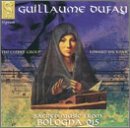| All Artists: Dufay, Clerk's Group, Wickham Title: Sacred Music From Bologna Members Wishing: 1 Total Copies: 0 Label: Signum UK Release Date: 6/18/2002 Album Type: Import Genre: Classical Styles: Opera & Classical Vocal, Historical Periods, Early Music Number of Discs: 1 SwapaCD Credits: 1 UPCs: 675754519827, 635212002322, 669910052365 |
Search - Dufay, Clerk's Group, Wickham :: Sacred Music From Bologna
CD Details |
CD ReviewsSuperb! What Else Would You Expect... Giordano Bruno | Wherever I am, I am. | 10/20/2008 (5 out of 5 stars) "... from the glorious English voices of The Clerks' Group, whose recordings of Ockeghem and Josquin have set the bar for those later Renaissance masters? The music of Guillaume Dufay (1400-1474), however, is of a long generation earlier than Josquin's - Dufay truly makes the transition from "medieval" to "renaissance" more obviously than any other composer - and vocal techniques that serve the polyphony of 1500 so well often mush up the angular, hockety, oddly-tuned isorhythmic motets of 1425. Director Edward Wickham has put the Clerks on the right path by performing all twelve of these early Dufay works one on a part. It's the only way they can be done, regardless of what any other ensemble essays. I'm speaking specifically of the Dufay works in the very large MS Q15 from the civic museum of Bologna; these pieces are patently Dufay BEFORE the influence of the English composers, especially Dunstaple, led him to expand his harmonic vocabulary and extend his gift for melody into the soaring horizontal contrapuntal polyphony that totally revolutionized the sensibilities of the next generation. If Dufay had died young, he would still have ranked among the best composers of the 'ars subtilior' style associated with the Avignon Popes, but he would have have been an innovator.
Most of these pieces are structured isorhythmically, which is to say that the long notes you hear sung by the tenor voices are repeated in the same sequence by with shorter of longer note values. Imagine singing the tenor phrase first in whole notes, then in half notes, then in dotted quarters, while the "superius" and "altus" voices braid elaborate strings of eighths and sixteenths above. Then have two tenors singing interlocking isorhythms, while the upper voices sing in hockets - alternating the notes of a melodic line back and forth like ping-pong balls. If it sounds highly mathematical, it is, but only to the attentive mind. As a listening experience, these pieces are best sung very freely and brightly. Even the most somber religious text can't be allowed to deaden the rhythmic energy of the singing. Too slow and 'spiritual' is musical suicide. The Clerks' Group is blessed in its balanced blend of voices. Soprano Lucy Ballard sounds remarkably like a very skilled countertenor. That's meant to be praise; because of her voice timbre, the Clerks do NOT suffer a bifurcated male/female cleavage of timbres. Sounding alike and singing phrases with utmost attention to shaping them alike are what make this music coherent. Director Wickham has made another wise decision in underlaying text to the tenor lines on all but one piece. The articulation of syllables - consonants and vowels - is another secret to keeping the rhythmic energy high. Wickham, by the way, was a student of Reinhard Strohm, the greatest musicologist of the era. Other ensembles, I fear, lack faith in the music. They often suppose that, without bells and whistles in the form of exotic instruments, the music will lack variety and fail to hold the attention of modern listeners. This CD should quiet that false supposition forever. Really artful music and really glorious singing provide enough variety for me." |

